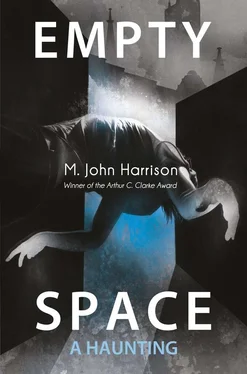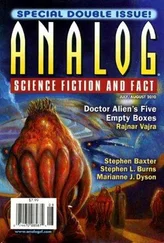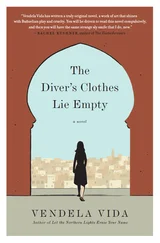‘You’re sure?’
‘We can usually recognise one when we see it.’
The doctor grinned whitely and, already sick of shouting to be heard over the roar of the diesel, failed to reply.
Not long later he rolled off his powdered nitrile gloves and informed the attending police officers: ‘A stroke. Massive.’ Everyone at his practice knew Anna Waterman.
‘What’s that in her hand?’
When they pried the object loose, it turned out to be an outboard computer drive with a polished titanium shell and a style of connection port no one had seen except in museums. They passed it about, rubbing their fingers over some deep, etched-looking marks at one corner. The paramedics, meanwhile, got the body on to a trolley and pushed it effortfully up the lawn, leaving tracks in the dew. The doctor watched them go. ‘She was a nice old woman,’ he said to no one in particular. ‘A bit mad, like most of that generation.’ Suddenly depressed, he leant on the orchard fence and looked out across the meadow at some wisps of mist dissipating above the river. He was thirty years old. Anna’s age weighed on him. She had seen the world when it was still proud of its future, blown, like its economy, as a stream of bubbles. Behind him, the remains of the summerhouse settled suddenly. Dust puffed up, and from inside came faint scraping noises.
‘I think there’s an animal in there,’ one of the police said.
‘Hurry and rescue it then,’ the doctor advised without turning to look. He laughed. ‘I can’t see a health and safety issue.’ He left them to it and went up to the house to make out the formal notice of death and call the daughter.
When Marnie Waterman arrived she found a note from him. In handwriting precise and careful, it told her how to proceed; he had also left a leaflet entitled What to do when someone dies . She folded the note in half, and then in half again. No one seemed to know what had happened to the summerhouse, much less to the cat. She watched the policemen, still waist-high in the wreckage, calling out like people who had never had much to do with pets. Stopping her car to allow the ambulance to pass in the narrow lane between Cottishead and Wyndlesham, she hadn’t thought that her mother might be in it.
‘Oh Anna,’ she said, as if Anna had let her down in some way.
She repeated that silently to herself, in one tone of voice or another, all morning — talking to the police, driving to Lewes to identify her mother at the mortuary, filling in forms, making arrangements. ‘Oh Anna.’ It was less pejorative than it sounded. It was a murmur of disbelief.
Four hours later, she was back at the end of the garden, where, alone with her thoughts in the sun, she made the same mistake as the firemen — although what she thought she saw at the base of the summerhouse was not a heap of embers but an illustration from an old-fashioned children’s book. Kegs and brassbound caskets were depicted spilling their contents — surely ‘treasure’? — across the floor of a sea-polished cave, in the dimness of which it was difficult to tell salty pebbles from jewels the size of hen’s eggs or hanks of weed from fabrics rich and strange.
A washy resolve converted this semiotic boutique to something she could understand: burst removers’ boxes, some of them twenty years old, full of stuff she had almost managed to forget. Her father’s collection of ancient maps and charts, curtains Anna couldn’t be persuaded to throw out. Christmas tree decorations. A Hornby trainset still in its box. A cannon. Coloured plastic crockery too small for a picnic, too large for a toy. Trick items Marnie had collected, age seven, when she determined to be a magician: joke liquorice, ‘X-Ray Specs’, handcuffs you couldn’t take off. There was a japanned box in which you placed a billiard ball you would never find again, though you could hear it rattling about in there forever. There was the cup with a reflected face in the bottom that turned out not to be your own; the valentine heart which lit itself up by means of loving diodes within. They were children’s things, made of Chinese plastic, cheap rubber, feathers: objects trivial in their day but now of great value to collectors.
‘I feel at a loss,’ Marnie told herself.
While she was in Lewes, the police had given up on James the cat and departed on some other errand. Marnie was relieved. Their energy had been a burden, on a day when she didn’t have much energy of her own. Should she have offered them a cup of tea? They hadn’t seemed to expect it.
James was an old cat now. She had never much liked him, but her parents had been gently determined that she keep a pet. It was as if they were encouraging her, at the age of thirteen, to accept emotional ties of her own, to love something as much as they loved each other, to take her first steps on the path to becoming them. If she wasn’t quite as enthusiastic, Marnie had been willing enough: but James, proving standoffish, stubborn, obsessed even as a kitten, soon relieved her of the effort. She had envied him to start with, then, in a sense, forgotten him. If he had vanished now, it was just another absence in a history of absences. All of this — the cat quietly making a kingdom of its own in the long grass and thistles between the orchard and the river, then Tim dying, now Anna dying — made life seem so sinister for a moment that she sat unable to move. Up in the house the phone rang; but by the time she got there whoever it was had stopped trying. Rather than do nothing, she went through Anna’s messages. One was from a decorator whose quote for the bathroom seemed quite high, another the usual failed attempt to connect by an automated cold-calling service; a third was from Marnie herself, left late on the previous evening in a voice so tired she barely recognised it as her own:
‘Mum, I’ve got some news about my tests.’
The remaining calls, half a dozen of them, were from Anna’s psychiatrist. They sounded urgent. About to call her back, Marnie heard a noise in the kitchen, the cat nosing its food bowl about on the tiles.
‘James!’ she said. ‘Oh, James!’
Caught in the client’s naive but effective web of transference, counter-transference and projective identification — and more rattled than she was willing to admit by Anna’s defection — Helen Alpert had made the first of these calls on her way back from Walthamstow the previous evening.
No reply. Quick to associate that with the idea of failing to connect, she had stopped the Citroën at the side of the A406 somewhere on the long arc of planning blight between Brent Cross and Neasden, struggling twenty yards away from it in the roar and swash of the passing traffic to be sure she had a signal. A minicab driver had pulled up and, assuming something was wrong with her car, first opened the bonnet without permission, then kept offering to drive her somewhere. After she had persuaded him to leave her alone she sat exhaustedly in the Citroën’s rear seat for half an hour, as if she’d given up after all and allowed herself the luxury of being a passenger. Safe in Richmond, she had begun calling again, three times in a five minute period. ‘Anna, I’ve got news I’m convinced might change your mind. Could we talk just once more? Do call when you get home!’ She had leafed through the case notes until late; fallen asleep trying to understand where she had broken her own rules.
Now it was four o’ clock in the afternoon. Outside her consulting room the Thames ran backwards; flushed with tidal mud, it spilled across the Mall at the junction with Chiswick Lane. Sunlight, weakened and softened by the riverine air, reflected from the papers spread chaotically across her desk, highlighting the favourite vase, the petals of gladioli. Dr Alpert tried to read. She wrote, ‘Anna believes that —’ but was otherwise unable to commit herself. In the margins of the neurologist’s report, she discovered her name written several times in her own hand, as if by someone trying to solve an anagram. It was not the disorganised nature of these responses, she believed, that had made her so anxious.
Читать дальше












